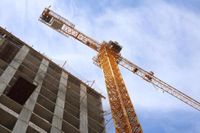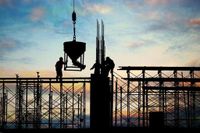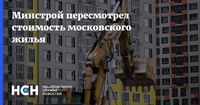The Russian housing market is currently experiencing a significant downturn, with a notable decrease in new construction projects and rising concerns over mortgage accessibility. According to Deputy Minister of Construction and Housing Nikita Stasishin, the market is launching 26% fewer new projects than in previous years, marking the lowest level of activity in five years.
This decline in new housing starts is attributed to several factors, including high mortgage rates and strict lending conditions. Stasishin highlighted that during the peak of the market in 2023, developers had invested heavily in land acquisition, often relying on short-term loans with higher interest rates. Now, as the market contracts, many developers are focusing on completing existing projects rather than pursuing new ones, primarily to settle debts with banks.
Elvira Nabiullina, the head of the Central Bank of Russia, emphasized that while housing sales remain at acceptable levels, the overall environment is challenging. "Sales of housing remain at an acceptable level, which allows developers to complete ongoing projects and launch new ones, although the scale of new project launches has decreased," she stated.
In light of this situation, the Central Bank plans to recommend that banks restructure loans for borrowers affected by fraud in the construction of individual housing. Additionally, measures to support the construction industry may be discussed at a State Council meeting on April 15, 2025, as indicated by Stasishin.
Stasishin also pointed out that the current mortgage conditions are hindering sales. The subsidized programs are perceived as too strict, while market rates remain prohibitively high. "Often, there are opinions that developers are making a fortune. I know for sure that if there was an opportunity for developers and there were super-profits, we would have seen some kind of correction of the price per square meter," he remarked.
In the context of the housing market, the Ministry of Construction has recently set the cost per square meter in Moscow at 176.76 thousand rubles for the second quarter of 2025, reflecting a nominal increase of 0.6% compared to the previous quarter. This price is crucial for calculating social payments, including subsidies for families purchasing housing.
Meanwhile, the production of construction materials is also declining. In January and February 2025, the production of ceramic tiles fell by 23.5%, cement products by 11.7%, and silicate blocks by 8.7%. Despite this downturn, manufacturers are optimistic about a potential revival in construction by 2026, with many factories updating their equipment and preparing for future demand.
The National Association of Producers of Building Materials and Construction Industry (NOPSM) reported that the primary impact of the downturn has been on basic categories such as concrete, cement, and bricks. As demand decreases, many manufacturers are experiencing financial strain, with rising costs and increased competition further complicating the situation.
Interestingly, there is a shift in focus from large developers to private builders and the renovation market, as many people are opting to renovate their existing homes rather than purchase new ones. This trend is supporting demand for finishing materials and dry mixes.
In terms of regional activity, Rostov-on-Don has taken second place in new construction projects, with three projects and six buildings totaling 52.1 thousand square meters and 841 apartments. Moscow, despite being in third place for the number of projects, leads in supply volume with 142.7 thousand square meters, comparable only to St. Petersburg. Conversely, cities like Ufa, Tyumen, and Novosibirsk have shown minimal activity, each starting only one project.
As the construction industry faces these challenges, there are calls for government support to stabilize the market. Stasishin warned that without intervention, the sector could collapse, leading to a further reduction in new developments and a decrease in the number of active developers.
In response to the evolving market conditions, the government is considering various measures to stimulate the construction sector, including increasing the amount of family mortgage credits and potentially easing restrictions on mortgage programs. However, officials have indicated that no new subsidized mortgage programs are planned at this time.
Looking ahead, the construction industry is expected to undergo significant changes, especially in new regions of Russia where the government plans to increase the share of local construction products. This initiative aims to localize production and enhance the supply chain within these areas.
In conclusion, the Russian housing market is at a critical juncture, grappling with declining construction activity and challenging economic conditions. Stakeholders across the industry are hopeful that strategic government interventions and a focus on modernization will pave the way for recovery in the coming years.







